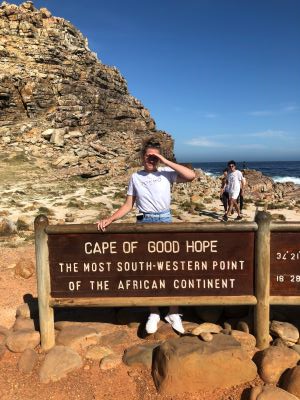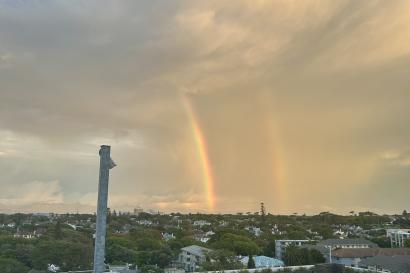IES Abroad: Since your semester ended (virtually speaking), what have you been up to? And what are your plans for fall and moving forward?
Mary Enright (ME): Upon the completion of my online courses at the University of Cape Town, I participated in an internship program with a technology and home services startup in Chicago, Illinois (virtually, of course). I worked with the content and marketing teams with some blogging and on-page content web content. (As you can see, I never stop writing!)
Now, I am now in my (ever so unusual) senior year at Villanova University. I am a marketing major with minors in creative writing and communications, and I am looking forward to graduating next Spring. Upon graduation, I plan to take part in a year-long service learning program, and I am currently in the process of applying for those roles (fingers crossed!). After that, I am hoping to hit the international marketing scene in either the nonprofit or technology startup sectors (I have a few too many interests for my own good).

IES Abroad: Given your unique experience this past spring, why would you still recommend that students study abroad? Why now, more than ever, is it important to do this?
ME: I am so glad that you asked this question, because now I have a warranted reason to stand on my soapbox. If you read through my blog, you’ll find a common theme that speaks to the importance of engagement with a diversity of people (whether through literal study abroad, or through interaction with people unlike yourself at home). And regardless of the circumstances that I underwent during my study abroad experience, I stand by the fact that studying abroad is a fantastic opportunity to experience that engagement.
There is so much to learn about yourself, others, and the world we all live in from immersing yourself in another culture. In my experiences living and traveling abroad, I have grown significantly in terms of my self awareness, my understanding of cultural differences and respecting them, and more. I was fortunate enough to grow up as the child of two parents in the hospitality industry, which means that the importance of travel has been made clear to me since I was a child. This is what leads me to stand on my soapbox, and strongly recommend that if students have the ability to, they should pursue a study abroad opportunity, even if you run the risk of getting sent home.
IES Abroad: How did you manage the ambiguity and uncertainty associated with being abroad/far from home during the start of the pandemic?
ME: Being away from home at the start of the COVID-19 pandemic was a strange and discomforting experience. Largely because South Africa did not begin to experience the presence of the coronavirus until later than most Western countries, the concept was a bit estranged to me. Through speaking with family and friends back home, I began to be made aware of what was going on, yet from afar. However, I navigated that uncertainty by relying on the people around me. Myself and the friends that I made during my time in South Africa really stuck together and tried to support one another through the ambiguity we were all facing. The same way that studying abroad in general can be ambiguous and uncertain at times, this experience was odd. But, it’s all a part of the process, and I wouldn’t change the way my semester abroad played out for anything.
IES Abroad: It looks like you really tried to make the most of your time in Cape Town before you left. How would you recommend making the most of your host city or experience overall in a limited amount of time?
ME: Yes, I did, because how could I not! Cape Town is one of the most breathtaking, lively, melodic, powerful and culturally palpable cities that I have had the pleasure of interacting with. There’s still so much I wish I could’ve done and believe me, I’ll be back to do them.

It may sound simple, but make a list, and promise yourself you’ll hit everything you include! It can get easy, especially once you’re comfortable, to start to forget that you are only in your host city for a finite amount of time, and that there are a seemingly infinite number of things to see and do within that finity. One way I made sure that I got the most of Cape Town when I was there was to be as much of a ‘Yes (Wo)man’ as possible. Always keep an open mind, and take advantage of every opportunity you are given to experience your host city in full.
IES Abroad: You continued to learn from and about your host city once you returned home. How can students not going on campus or abroad this fall engage with the larger world remotely?
ME: There are so many ways to engage with the world at large, as long as you put in the effort to do so. As implied by my participation as an IES Abroad Correspondent this year, I am a big writer and reader, so that’s typically how I choose to engage. If there’s something or somewhere I want to learn about, I find a book to read or do some research to write a blog about it so that other people can learn about it too. For instance, I have been reading Prison Letters by Nelson Mandela to continue to learn about South Africa and its complex political and economic history. It's all about finding a way to use something you like to do to also serve the purpose of self-education: podcasts, news apps, Reddit threads, direct correspondence, you name it. We are fortunate to have access to more information than we can consciously comprehend—do with it what you can and should!
IES Abroad: You wrote about being a responsible visitor. What does responsible in this context look like and how do you compare studying abroad to being a ‘tourist’?
ME: Responsibility is such an important part of visiting another place. Places hold so much more than physical location; they hold people, a culture, a history and all of the facets that come along with those things. Each and every one of those aspects of place deserves to be respected, and to be treated in such a way that correlates with that respect.

Just as I expressed in my blog about the responsibility of studying abroad, when you’re living in another place (rather than just as a tourist), it is that much more important to show respect. You are a guest in someone else’s home, and with that comes a certain responsibility to treat it, and its people, culture, history, and more, as you wish yours would be treated. This means being mindful of cultural differences, investing time in educating yourself about those differences and the political, economic, and social environment you are entering, and engaging with it in a way that showcases acceptance and immersion of interest.
IES Abroad: Privilege is an important topic right now. Can you speak to how studying abroad helped you recognize your own privilege?
ME: Privilege is and was (while I was in South Africa) a common and recurring topic of conversation and consideration. It is something that I came to acquaintance with quite often during my study abroad experience. As a result of my background and upbringing, I was not made fully aware of my privilege regularly growing up. However, upon spending a semester abroad, on my own, in a country with a rich and complex political and social history, that was no longer the case. My privilege was staring me right in the face—starting right with the fact that I had the privilege in the ability and opportunity to study abroad in the first place.
Studying abroad is what put that privilege on my plate, and asked me to see it, feel it, taste it, and form an opinion about it. It is the very moment and experience that begged me to inform and educate myself about my own privilege, what it means, why it matters, how I can both combat it and utilize it in the situations that ask for each of those responses. I am glad that I was put in a situation that pushed me to recognize my privilege, and that I now am more aware and equipped to continue to recognize my privilege as we, as society, face the important topics in front of us today.
IES Abroad: Anything we didn’t ask about that you’d like to share?

ME: For starters, a large and highly deserved thank you to IES Abroad, and all of the incredible people that are a part of it, for making my experience in South Africa (though short) memorable, transformative, and just all around incredible. It was such a pleasure getting to know the Centre staff, learn from them, and share my experience with them. So, thank you to you all!
Also, if I didn’t stress it enough on my soapbox earlier, I’m back to tell you to! study! abroad! And if you’re feeling conflicted, nervous, or any of the other perfectly normal emotions that come with the study abroad experience, remember that there are plenty of resources for you in the IES Abroad team and study abroad alumni (including me!). Us study abroad-ers are all a family, and I strongly recommend that you become a part of it! You won’t regret it :

Mary Kaitlin Enright
I was born and raised in Glenview, Illinois, a suburb of the beautiful city of Chicago. When I was fifteen, I was surprised by the unexpected opportunity to move to Hong Kong, when my family was transferred there. That was the very beginning of my relationship with the travel bug, by which I have been afflicted ever since. I spent time traveling around Asia with my family throughout high school, then traveling through Europe in my first year of college while studying abroad in London. Now a Marketing student at Villanova University with minors in Creative Writing and Communication, my next stop is Cape Town, South Africa, and I am excited to share my experience with the world.








